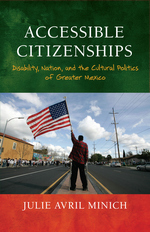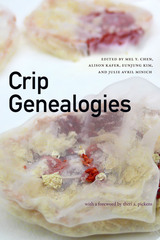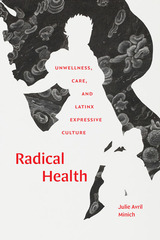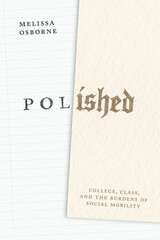3 books by Minich, Julie Avril

Accessible Citizenships
Disability, Nation, and the Cultural Politics of Greater Mexico
Julie Avril Minich
Temple University Press, 2013
Accessible Citizenships examines Chicana/o cultural representations that conceptualize political community through images of disability. Working against the assumption that disability is a metaphor for social decay or political crisis, Julie Avril Minich analyzes literature, film, and visual art post-1980 in which representations of non-normative bodies work to expand our understanding of what it means to belong to a political community.
Minich shows how queer writers like Arturo Islas and Cherríe Moraga have reconceptualized Chicano nationalism through disability images. She further addresses how the U.S.-Mexico border and disabled bodies restrict freedom and movement. Finally, she confronts the changing role of the nation-state in the face of neoliberalism as depicted in novels by Ana Castillo and Cecile Pineda.
Accessible Citizenships illustrates how these works gesture towards less exclusionary forms of citizenship and nationalism. Minich boldly argues that the corporeal images used to depict national belonging have important consequences for how the rights and benefits of citizenship are understood and distributed.
A volume in the American Literatures Initiative
A volume in the American Literatures Initiative
[more]

Crip Genealogies
Mel Y. Chen, Alison Kafer, Eunjung Kim, and Julie A. Minich, editors
Duke University Press, 2023
The contributors to Crip Genealogies reorient the field of disability studies by centering the work of transnational feminism, queer of color critique, and trans scholarship and activism. They challenge the white, Western, and Northern rights-based genealogy of disability studies, showing how a single coherent narrative of the field is a mode of exclusion that relies on logics of whiteness and imperialism. The contributors examine how disability justice activists work in concert with other social justice projects, explore crip environments, create alternate disciplinary genealogies, and reject notions of the model minority. Throughout, they demonstrate how the mandate for a single genealogy of the discipline whitewashes disability and continues forms of violence. By cripping disability studies, the contributors allow for divergent histories, the coexistence of anti-ableist and antiracist theorizing, and a radically just and capacious understanding of disability.
Contributors. Suzanne Bost, Mel Y. Chen, Sony Coráñez Bolton, Natalia Duong, Lezlie Frye, Magda García, Alison Kafer, Eunjung Kim, Yoo-suk Kim, Kateřina Kolářová, James Kyung-Jin Lee, Stacey Park Milbern, Julie Avril Minich, Tari Young-Jung Na, Therí A. Pickens, Leah Lakshmi Piepzna-Samarasinha, Jasbir K. Puar, Sami Schalk, Faith Njahîra Wangarî
Contributors. Suzanne Bost, Mel Y. Chen, Sony Coráñez Bolton, Natalia Duong, Lezlie Frye, Magda García, Alison Kafer, Eunjung Kim, Yoo-suk Kim, Kateřina Kolářová, James Kyung-Jin Lee, Stacey Park Milbern, Julie Avril Minich, Tari Young-Jung Na, Therí A. Pickens, Leah Lakshmi Piepzna-Samarasinha, Jasbir K. Puar, Sami Schalk, Faith Njahîra Wangarî
[more]

Radical Health
Unwellness, Care, and Latinx Expressive Culture
Julie Avril Minich
Duke University Press, 2023
In Radical Health Julie Avril Minich examines the potential of Latinx expressive culture to intervene in contemporary health politics, elaborating how Latinx artists have critiqued ideologies of health that frame wellbeing in terms of personal behavior. Within this framework, poor health—obesity, asthma, diabetes, STIs, addiction, and high-risk pregnancies—is attributed to irresponsible lifestyle choices among the racialized poor. Countering this, Latinx writers and visual artists envision health not as individual duty but as communal responsibility. Bringing a disability justice approach to questions of health access and equity, Minich locates a concept of radical health within the work of Latinx artists, including the poetry of Rafael Campo, the music of Hurray for the Riff Raff, the fiction of Angie Cruz, and the performance art of Virginia Grise. Radical health operates as a modality that both challenges the stigma of unhealth and protests the social conditions that give rise to racial health disparities. Elaborating on this modality, Minich claims a critical role for Latinx artists in addressing the structural racism in public health.
[more]
READERS
Browse our collection.
PUBLISHERS
See BiblioVault's publisher services.
STUDENT SERVICES
Files for college accessibility offices.
UChicago Accessibility Resources
home | accessibility | search | about | contact us
BiblioVault ® 2001 - 2024
The University of Chicago Press









